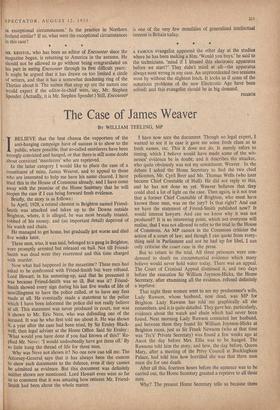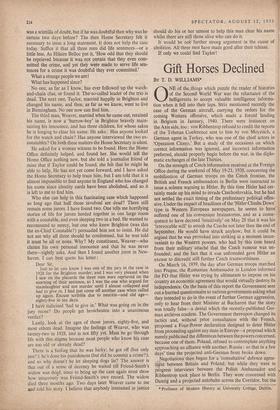The Case of James Weaver
BY WILLIAM TEELING, MP IBELIEVE that the best chance the supporters of the anti-hanging campaign have of success is to show to the public, where possible, that so-called murderers have been wrongly convicted and hanged, or that there is still some doubt about convicted 'murderers' who are reprieved.
In the latter category I would like to place the case of a constituent of mine, James Weaver, and to appeal to those who are interested to help me have his name cleared. I have tried this in the House of Commons already, and I have come away with the promise of the Home Secretary that he will reopen the case if I can bring forward fresh evidence.
Briefly, the story is as follows : In April, 1928, a retired chemist in Brighton named Friend- Smith was attacked and taken up to the Downs outside Brighton, where, it is alleged, he was most brutally treated, robbed of his money, and (an important detail) deprived of his watch and chain.
He managed to get home, but gradually got worse and died live weeks later.
Three men, who, it was said, belonged to a gang in Brighton, were promptly arrested but released on bail. Not till Friend- Smith was dead were they rearrested and this time charged With murder.
Now what had happened in the meantime? These men had asked to be confronted with Friend-Smith but Were refused. Lord Hewart, in his summing-up, said that he presumed it Was because Friend-Smith was so ill. But was it? Friend- Smith showed every sign during his last five weeks of life of Unwillingness to have the police called, or to have any fuss made at all. He eventually made a statement to the police which I have been informed the police did not really believe at all. This statement was never produced in court, nor was it shown to Mr. Eric Neve, who was defending one of the accused. It was he who first told me about it. He was shown it, a year after the case had been tried, by Sir Ernley Black- well, then legal adviser at the Home Office. Said Sir Ernley : `What would you have done if you had known of this?' Re- plied Mr. Neve : 'I would undoubtedly have got them off.' By so little hung the thread of life for three men.
Why was Neve not shown it? No one now can tell me. The Attorney-General says that it has always been the custom to show such documents to the defence, even if they cannot be admitted as evidence. But this document was definitely neither shown nor mentioned. Lord Hewart even went so far as to comment that it was amazing how reticent Mr. Friend- Smith had been about the whole matter. I have now seen the document. Though no legal expert, I wanted to see it in case it gave me some fresh clues as to fresh names, etc. This it does not do. It merely refers to timing, which I believe would have made some of the wit- nesses' evidence be in doubt; and it describes the attacker, who quite obviously was not my constituent, Weaver. In the debate I asked the Home Secretary to find the two chief policemen, Mr. Cyril Beer and Mr. Thomas Wells (who later became Chief Constable of Hull). He did not reply to this, and he has not done so yet. Weaver believes that they could shed a lot of light on the case. Then again, is it not true that a former Chief Constable of Brighton, who must have known these men, was on the jury? Is that right? And can we have the statement of Friend-Smith published now? It would interest lawyers. And can we know why it was not produced? It is an interesting point, which not everyone will realise, that I was not allowed to refer to the trial in the House of Commons. An MP cannot in the Commons criticise the action of a court of law; and though I can quote from every- thing said in Parliament and not be had up for libel, I can only criticise the court case in the press.
But to return to the trial. All three prisoners were con- demned to death on circumstantial evidence which many believe would never hold water today. There was an appeal. The Court of Criminal Appeal dismissed it, and two days before the execution Sir William Joynson-Hicks. the Home Secretary, after examining all the evidence, refused definitely a' reprieve.
That night three women went to see my predecessor's wife, Lady Rawson, whose husband, now dead, was MP for Brighton. Lady Rawson has told me graphically all she remembers, and it is quite detailed. They gave her, particularly, evidence about the watch and chain which had never been found. Next morning Lady Rawson contacted her husband, and between them they found Sir William Joynson-Hicks at Brighton races, just as Sir Frank Newsom (who at that time was `Jix's' Private Secretary) was found a few weeks ago at Ascot the day before Mrs. Ellis was to be hanged. The Rawsons told him the story, and how, the day before, Queen Mary, after a meeting of the Privy Council at Buckingham Palace, had told him how horrified she was that three men must die for one death.
After all this, fourteen hours before the sentence was to be carried out, the Home Secretary granted a reprieve to all three men.
Why? The present Home Secretary tells us because there was a scintilla of doubt, but if he was doubtful then why was he certain two days' before? The then Home Secretary felt it necessary to issue a long statement. It does not help the case today. Suffice it that all three men did life sentences—or a little less. As Hilaire Belloc put it, 'How odd that they should be reprieved because it was not certain that they even com- mitted the crime, and yet they were made to serve life sen- tences for a crime it was doubtful they ever committed.'
What a strange people we are!
What has happened since?
No one, as far as I know, has ever followed up the watch- and-chain clue, or found it. The so-called leader of the trio is dead. The next one, Taylor, married happily in Brighton and changed his name, and then, as far as we know, went to live in Birmingham. No one now can find him.
The third man, Weaver, married when he came out, retained his name, is now a 'barrow-boy' in Brighton bravely main- taining his innocence, and has three children, for whose sakes he is longing to clear his name. He asks : Has anyone looked for the watch and chain? Has anyone interviewed the two ex- constables? On both these matters the Home Secretary is silent.
He asked for a woman witness to be found. Here the Home Office definitely helped, and found her. She would tell the Home Office nothing new, but she told a journalist friend of mine that if Taylor could be found, she felt that he might be able to help. He has not yet come forward, and I have asked the Home Secretary to help trace him; but I am told that it is almost impossible to find anyone in England who has changed his name since identity cards have been abolished, and so it is left to me to find him.
Who else can help in this fascinating case which happened so long ago that half those involved are dead? There still remain some jurors. I have found two. One tells me horrifying stories of life for jurors herded together in one large room with a constable, and even sleeping two in a bed. He wanted to recommend to mercy, but one who knew Brighton (was this the ex-Chief Constable?) persuaded him not to insist. He did not see why all three should be condemned, but he was told it must be all or none. Why? My constituent, Weaver—who claims his own personal innocence and that he was never there—rightly asks. And then I found another juror in New- haven. I can best quote his letter :
Dear Sir,
Just to let you know I was one of the jury in the case in 1928 for the Brighton murder, and I was very pleased when I saw on the placards the three men were reprieved on the morning of their sentence, as I was the one who argued for manslaughter and not murder until I almost collapsed and had to give in. I had just come off another case when called up again. Excuse scribble due to neuritis—and old age— eighty-five in ten days.
I have italicised 'had to give in.' What was going on in the jury room? Do people get broWbeaten into a unanimous verdict?
Lastly, look at the ages of those jurors, eighty-five, and most others dead. Imagine the feelings of Weaver, who was twenty-two in 1928, and is not fifty yet. Must he go-through life with this stigma because most people who know his case are too old or already dead?
There is a feeling that he was lucky: he got off (but only just ! ); he's done his punishment (but did he commit a crime?); and so why doesn't he let sleeping dogs lie? The answer is that out of a sense of decency he waited till Friend-Smith's widow was deid, since to bring up the case again must show how unsavoury was Friend-Smith's own record. The widow died three months ago. Two days later Weaver came to me and told his story. I believe that anybody interested in justice should do his or her utmost to help this man clear his name whilst there are still those alive who can do it.
It would be one further strong argument in the cause of abolition. All three men have made good after their release. If only we could find Taylor!



































 Previous page
Previous page